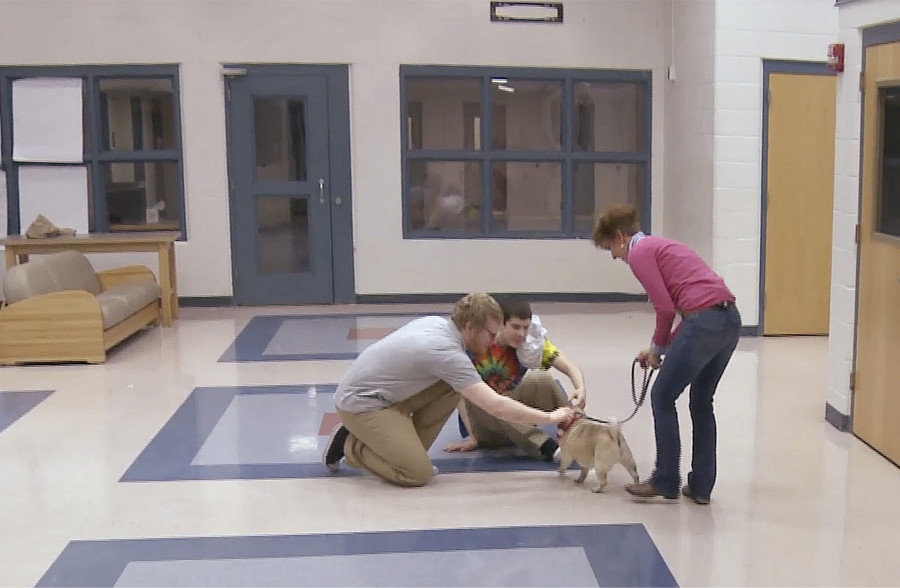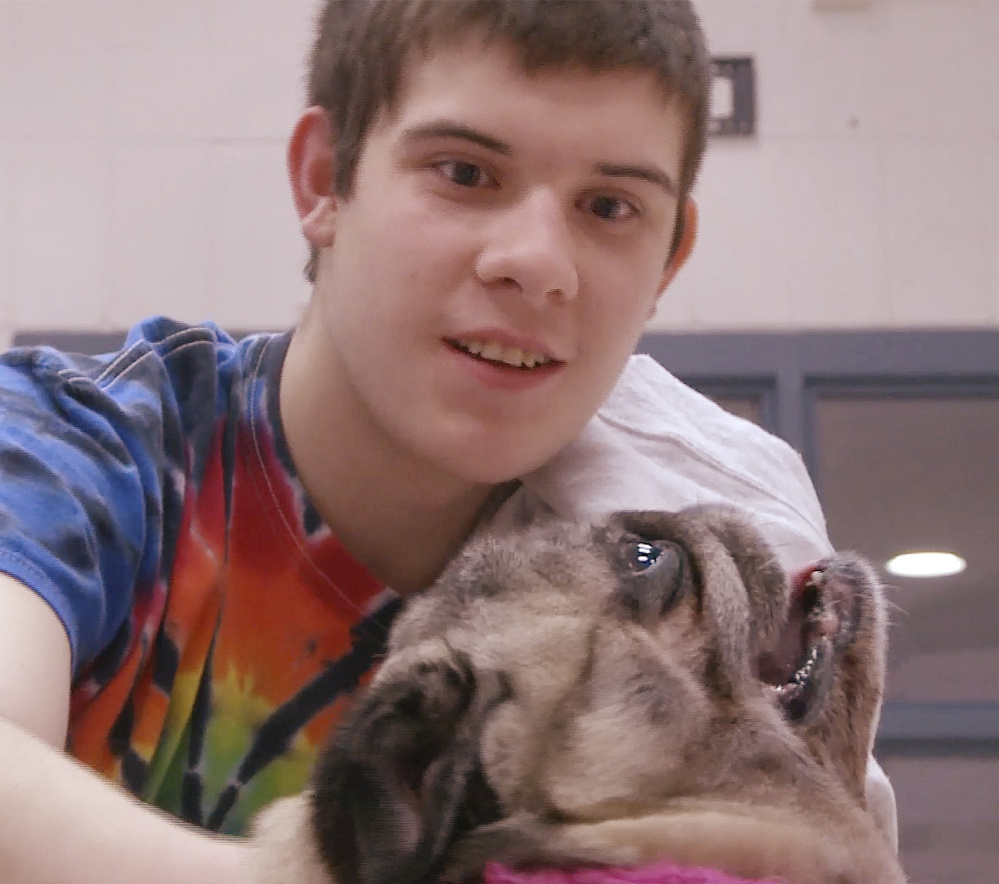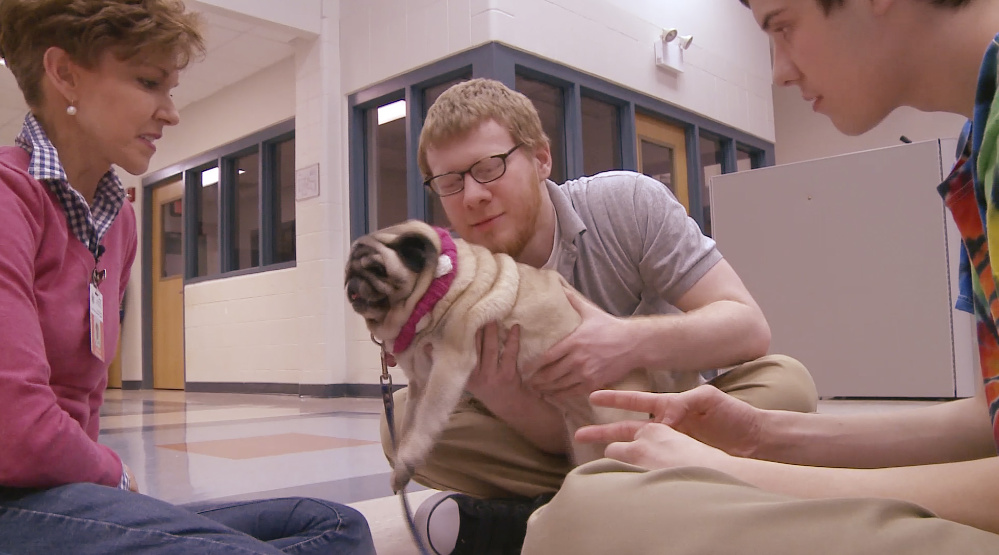On a cold, snowy Friday evening, Lori Sirois and her 11-year-old, 16-pound pug, Cuppy, wait patiently in front of a metal door at the Long Creek Youth Development Center, a South Portland facility for juvenile offenders.
As the door opens with a loud clank, Sirois, 51, wearing a bright pink sweater, and Cuppy, whose neck is swathed in a matching pink scarf, walk briskly into one of the housing pods in the men’s unit.
“Cuppy’s here today!” Sirois exclaims to the two young men standing nearby.
Soon, Sirois and Long Creek residents Kastan O’Dell and Justice Wright, both 19, are sitting on the shiny linoleum floor with Cuppy sprawled in front of them.
“That’s a good girl,” O’Dell says as he rubs the pug’s stomach.
Sirois, who has three pugs – Cuppy, Sissy and a puppy named Nelly – has been visiting Long Creek every week for the past three years. She’s also organized a group of about a half-dozen dog owners who come on Sunday.
All of the animals are registered therapy dogs.
“For the half-hour, hour they’re here,” O’Dell says, “I can just take my feelings and put them away and talk to the dogs.”
“Oh man, I love it,” says Wright, who has been incarcerated at Long Creek for 18 months. “This is a pretty stressful place a lot of the time. But when the dogs come in, I can sit down and relax. They make me laugh. They make me smile. They’re there for you.”
Long Creek houses about 90 juvenile offenders – males and females – from all over the state.
“We say we have 90 of the state’s toughest kids,” says the chief of volunteer services, Stephanie Netto. “We’re sort of the last stop.”
The facility offers a myriad of rehabilitation programs – counseling, education, job readiness, life skills – all in the hope of turning those young lives around. Netto says in an environment where an undercurrent of tension is the norm, the pet therapy program offers invaluable moments of calm and comfort.
“When the dogs go into a unit, you can feel sort of the temperature and the tension in the unit decrease,” she says. “It’s tangible.”
That sets the stage for conversations that might not otherwise happen.
“I’ll be with some of the kids for a while just sitting there,” Sirois says, “and they’ll be petting the dogs and they won’t be saying anything and then after a little while they’ll just start to open up.”
Sirois, who rarely misses a visit, takes a keen interest in the young people – and they know it.
“We can rely on her,” Wright says.
And that sends a powerful message.
“Hopefully, what they extrapolate from that is, ‘Maybe I’m not such a loser, after all,'” Netto says. ” ‘If this person is willing to commit their Friday nights to me, then maybe I have more going on for myself than I thought I did.’ ”
When they’re not “working,” Sirois’ pugs get a lot of down time at home in Portland with her and her husband, Jeff.
And then there’s their Instagram account. The “Pugdashians” have 15,000 followers.
Almost every day, Sirois posts a photo of the dogs dressed in homemade costumes: wrapped in colorful bunting posing as Easter eggs, wearing Santa outfits, draped in three strands of their “Barbara Bush pearls.”
“I posted one picture (18 months ago) and it just took off,” she says, laughing.
But she – and they – seem happiest reaching out to others.
Along with her weekly visits to Long Creek, she also takes the pugs to a Portland nursing home and a hospice center.
“I always try to put myself in other people’s shoes. If I were in the hospital, in hospice, in a nursing home, in the Youth Center, I would hope somebody would walk through the door and come visit me.”
That commitment isn’t lost on the residents of Long Creek.
“I never really had much of a connection with people,” Wright says. “But having Fridays to look forward to, … it’s comforting. It’s good to know that people care.”
Copy the Story LinkSend questions/comments to the editors.





Success. Please wait for the page to reload. If the page does not reload within 5 seconds, please refresh the page.
Enter your email and password to access comments.
Hi, to comment on stories you must . This profile is in addition to your subscription and website login.
Already have a commenting profile? .
Invalid username/password.
Please check your email to confirm and complete your registration.
Only subscribers are eligible to post comments. Please subscribe or login first for digital access. Here’s why.
Use the form below to reset your password. When you've submitted your account email, we will send an email with a reset code.